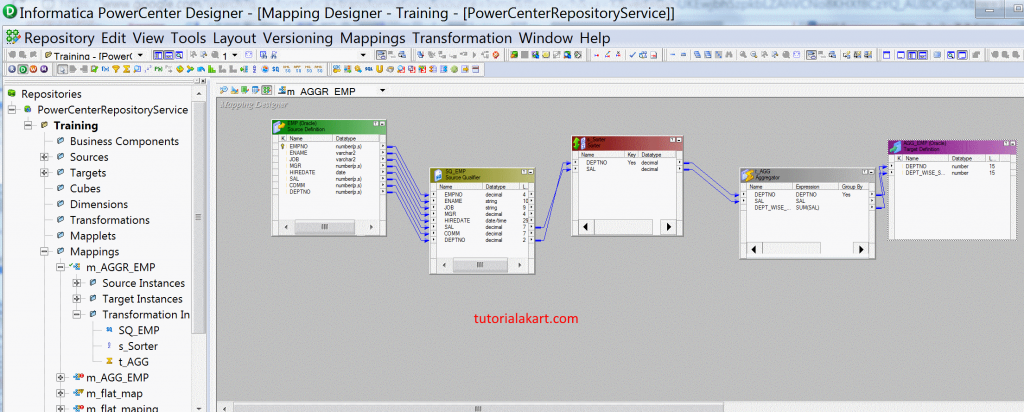Informatica Transformations
Informatica Transformations are PowerCenter repository objects that generates, modifies and passes data. Transformation allows you to define business rules for processing data. Informatica PowerCenter Designer provides a set of transformations to perform specific functions. Informatica Transformations are classified in to Active Transformations and Passive Transformations.
What is Active transformation?
Active transformation in Informatica can effect the no of rows that passes through the transformation, change the transaction boundary and or change the no of rows by taking ‘n’ of input records,can it may return <, =, > n no’of output records. The following are the list of active transformations used for processing the data.
| Transformation | Type | Description |
| Aggregator | Active/Connected | It performs aggregator calculations |
| Application Source Qualifier | Active/Connected | It represents the rows that the Integration service reads from an application, such as ERP source, when it runs a session. |
| Custom | Active or Passive / Connected | It calls a procedure in a shared library or DLL. |
| Filter | Active / Connected | It filters data. |
| Java | Active or Passive / Connected | Executes user logic coded in Java. The byte code for the user logic is stored in the repository. |
| Joiner | Active / Connected | Joins data from different databases or flat file system. |
| Normalizer | Active / Connected | Source qualifier for COBOL source. Can also use in the pipeline to normalize data from relational or flat file source. |
| Rank | Active / Connected | It limits records to a top or bottom range. |
| Router | Active / Connected | It routes data into multiple transformations based in group condition. |
| Sorter | Active / Connected | It sorts data based on a sort key. |
| Source Qualifier | Active / Connected | It represents the rows that the Integration service reads from a relational or flat file source when it runs a session. |
| Transformation Control | Active / Connected | It defines commit and rollback transactions. |
| Union | Active / Connected | It merges data from different database or flat file system. |
| Unstructured Data | Active or Passive / Connected | Transforms data in unstructured and semi-structured formats. |
| Update Strategy | Active / Connected | It determines whether to insert, delete, update or reject rows. |
| XML generator | Active / Connected | Reads data from one or more input ports and outputs XML through a single output port. |
| XML Parser | Active / Connected | Reads XML from one or more input ports and Outputs data to one or more output ports. |
| XML Source Qualifier | Active / Connected | Represents the rows that the Integration service reads from an XML source when it runs a session |
What is passive Transformation?
Passive Transformation in Informatica that does not affect the number of rows that passes through the transformation, maintains the transaction boundary and it does not change the number of rows by taking ‘n’ no’of input records and returns the same no of output records. Following are the list of passive Transformations used for processing the data.
| Transformation | Type | Description |
| Expression | Passive / Connected | It calculates a value. |
| HTTP | Passive / Connected | It connects to an HTTP server to read or update data. |
| Input | Passive / Connected | It defines mapplet input rows and available in the Mapplet designer. |
| Lookup | Passive / Connected or Unconnected | Looks up values. |
| Output | Passive / Connected | It defines mapplet output rows and available in Mapplet designer. |
| Sequence generator | Passive / Connected | It generated primary keys. |
| Stored procedure | Passive / Connected | It calls a stored procedure. |
Unconnected Transformation
Informatica Transformation can be connected to the data flow, or they can be unconnected. An unconnected transformation is no t connected to other transformation in the mapping and called within another transformation, and returns a value to that transformation.
How to create an Informatica Transformation.
Informatica transformation can be created using Designer tools such as Mapping Designer, Transformation developer and Mapplet Designer, then configure the transformation by adding ports, properties, groups, expressions and son on and finally link the transformation to other transformation and target definitions by drag and drop method in the mapping or mapplet.
Mapping Designer: Mapping Designer in Informatica creates transformations that connects Source to Target.
Transformation Developer: Transformation developer crates individual transformations called reusable transformations that can be used in other mappings.
Mapplet Designer: Mapplet designer creates and configures transformations called as Mapplets, these transformations can be used in multiple mappings.

Conclusion
I hope this Informatica Transformations tutorial was helpful to understand the basics of Informatica Transformations and in our upcoming Informatica Transformations tutorial, we will learn about each transformation in detail with example.
